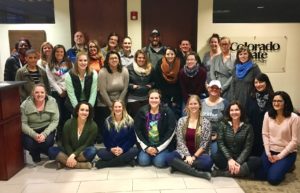
For distance students, beginning a master’s in social work at Colorado State University looks a lot like the program for on-campus students: joining peers in a cohort, building relationships with faculty, and adapting to the rigor of graduate studies.
The distance curriculum mirrors the on-campus program in terms of content, but the similarities end there. The coursework is designed specifically for distance student success, the result of a development partnership with CSU’s Institute for Learning and Teaching (TILT) and CSU Online.

“Through our partnership with CSU Online, each of our hybrid M.S.W. courses, and our online certificate courses, receive TILT development support,” said M.S.W. Programs Director Amy Martonis, who provided program leadership for the partnership effort.
Collaborative review for each course
The collaborative process spans from course conceptualization through launch, and to date includes 15 M.S.W. courses and 16 social work graduate certificate courses. It involved 24 faculty in the collaborative development.
Martonis, along with TILT’s Director of Instructional Technology Katy Little and Instructional Designer Greta Steber, outlined the process of collaborative curricular development at the May 2017 CSU Board of Governors meeting at the invitation of Provost and Executive Vice President Rick Miranda.
The meeting also included presentation teams from other departments, as well as CSU-Pueblo and CSU Global, and was attended by President Tony Frank.
“What’s great about the way these courses are developed is the collaboration. Our faculty serve as content experts, and the instructional designers at TILT bring expertise in online learning and adult education. The outcome is a thoughtfully designed course to promote student engagement and success,” Martonis said.
After faculty provide the content, it is filtered through a process of instructional design. A reciprocal process of content development and design revision happens for each module of the course until the course’s development team thinks it is ready for learners.
“Each course also goes through an internal review process before it’s published for students,” added Martonis, “which means by the time our students are in one of their online classes, it’s been through the instructor, the instructional designer, and a peer review team before it gets to our students.”
Instructors free to focus on content
“This process allows our faculty to focus on maximizing their content,” Martonis stated. “They don’t have to worry about structuring an online course or keeping up with best practices in online learning, because our partners at TILT provide that direction and support during the development cycle, which lasts a full semester before the course is scheduled to launch.”
Roughly 80 percent of the distance M.S.W. coursework is online. The remainder is provided during intensive learning weekends held twice per semester. Currently the school operates two distance M.S.W. cohorts, in Colorado Springs and Denver, with another set to begin in January 2018 in Boulder, and additional locations planned for the future.
While the expansion of the program is a significant impact, Martonis emphasized the benefit to students. “The aim is to create engaging courses that utilize cutting-edge instructional technologies. We’re focused on providing the best in online education for our distance students.”